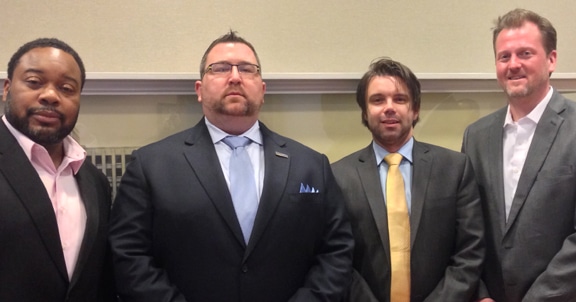The Federal Railroad Administration Feb. 10 will hold a public hearing before ruling on a waiver request by Southeastern Pennsylvania Metropolitan Transportation Authority (SEPTA)?to extend its current waiver of hours of service provisions for on duty points.
SEPTA has asked FRA to renew a waiver that the transit agency has had in effect for the past two years.
The rule in question involves the time employees spend traveling from home to start work somewhere other than their usual designated location. At issue is whether this time is considered as part of their hours of service.
In its written comments to FRA prior to this hearing, the SMART? Transportation Division said it “opposes SEPTA’s request because granting it would reduce much needed rest periods for operating employees and will put the traveling public and SEPTA employees at increased risk of fatigue related accidents.
“Fatigue related accidents are a particular concern because of SEPTA’s claim that it serves 3.8 million people and is the sixth largest U.S. commuter rail system, averaging approximately 127,000 daily weekday riders. Given the large amount of passengers that SEPTA carries, granting this waiver request will place crew members and the public in increased likelihood of fatigue-related accidents to help solve what are essentially crew scheduling issues.
“According to SEPTA, only seven assignments start at a location different than the regular reporting location for extra board employees. We estimate this waiver is a fix for less than five percent of SEPTA’s total jobs. Again, this is a crew scheduling issue and in no way justifies a waiver from minimal hours of service rules. If SEPTA needs help in managing crew availability and scheduling concerns, we would be happy to assist them.
“The SMART Transportation Division believes deadhead transportation to an on duty assignment should be counted as time on duty for SEPTA operations, just as it is counted as on duty for every other railroad in the country. The reason is simple, whether an employee is working on an assignment or driving to an assignment, they are still not receiving needed rest. There is no guarantee SEPTA will keep this system if given this waiver. It would clearly benefit SEPTA to remove it if this waiver is approved.
“The Metro-North accident in November 2013, resulting in the death of four people, was found to be caused by an engineer that ‘nodded off’ before the accident. The engineer had recently changed from an afternoon to morning shift, which could have impacted his internal clock. This should have been a wake-up call for SEPTA.
“In the interest of public safety and in the interest of preserving minimal hours of service standards, the SMART Transportation Division asks that the FRA decline this waiver request.
“In its petition, SEPTA states it has the support of the SMART Transportation Division for this waiver. This claim, along with much of SEPTA’s claims in this request, is inaccurate. We oppose this waiver request and ask that it be denied in its entirety.”
Transportation Division Pennsylvania Paul Pokrowka attended the Feb. 10 hearing.
“In October 2014, I attended SEPTA Local 61’s meeting and the membership unanimously asked me to fight this issue. This is of major concern for us due to safety of our members and the riding public. Fatigue related accidents are a huge concern to the Pennsylvania Legislative Board. SEPTA has chosen to spend their resources circumventing the system rather than working with this office for a proper resolution,” Pokrowka said.
The public hearing was scheduled for 10 a.m. at Baldwin Tower at 1510 Chester Pike in Crum Lynne, Pa.
Local 61 Legislative Rep. Keith English, Pokrowka, Local 1373 Legislative Rep. Kyle Brightbill and SEPTA General Committee of Adjustment Vice Chairperson Michael Stevens attend the Feb. 10 waiver request hearing before the Federal Railroad Administration.

 SMART Transportation Division Pennsylvania State Legislative Director Paul Pokrowka is calling on all members to help stop legislation introduced here that bans Southeastern Pennsylvania Transportation Authority employees from striking.
SMART Transportation Division Pennsylvania State Legislative Director Paul Pokrowka is calling on all members to help stop legislation introduced here that bans Southeastern Pennsylvania Transportation Authority employees from striking.